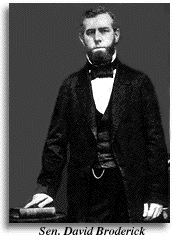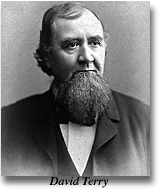Senator David Colbreth Broderick 1820-1859
Dueling was still considered a proper way to settle feuds in San Francisco in the 1850s. In 1936, San Francisco Municipal Court Judge Charles R. Boden spoke before a meeting of the California Historical Society about the Broderick-Terry duel, and his comments were published in society’s quarterly for December of that year:
Two men, both having suffered the disappointments and frustrations of political failure, were egged on by their...friends into fighting a duel for which neither of them had much stomach. After the election of 1859, Terry insisted on making a speech accusing the faction which had defeated him [for chief justice of the state supreme court] of being “the personal chattels of a single individual,” of belonging “heart and soul, body and breeches, to David C. Broderick.” The next morning, Broderick was overheard by a friend of Terry’s saying: “I have said that I considered him the only honest man on the supreme bench, but I now take it all back.” This was the provocation that led Terry to demand satisfaction. The duel was fought, and Broderick mortally wounded. On his death bed, he said: “They killed me because I was opposed to the extension of slavery and the corruption of justice.” Terry was tried and acquitted in Marin County. The duel resulted in post-mortem martyrdom for Broderick, and aroused such a hatred for Terry in San Francisco that he was forced to retire to Stockton.
In a footnote to the history of this duel, the two Belgian .58 caliber pistols used by Broderick and Terry were sold at auction in San Francisco on November 25, 1998. The cased single-shot pistol set, including a copper powder flask, loading rod and mallet, were purchased for $34,500, at a Butterfield & Butterfield auction, by an unidentified private collector.
This memorial to Senator Broderick, in the California Police Gazette, was published September 17, 1859, four days after the duel, and one day after Senator Broderick died.
Gladys Hansen
November 25, 1998
 On Friday, Sept. 16th, ’59, at
half-past 9 a.m., Hon. David C. Broderick,
Senator of the United States from our State, died from the effect of a
wound received in a duel, fought on Tuesday morning last, with David S.
Terry, formerly Chief Justice of the Supreme Court of California. With
the manner of his wounding we have nothing to do; the daily press, in their
partisan opinions, have given many different statements in regard to it,
and to them we refer for the particulars of the duel; our task is merely
to speak of a fallen hero, a good man gone to his death. For days previous
to his dissolution, the gloomy countenances of the whole people told how
great was the feeling for the wounded man, and the groups of sad faces
at all points in the city, showed the intense anxiety for his welfare.
All hopes, however, proved fallacious, and while the bright sun was shining
over our beautiful country, while everything in nature was arrayed in loveliness,
and while a multitude of eager friends were awaiting the results of the
efforts of his physicians, the spirit of the great man, the self-made leader
of senates, the warm friend, the truthful and magnanimous antagonist, passed
from the body and took its silent flight to the great unknown world of
space. Not only does a State mourn for its champion and defender, not only
does the population of the Pacific slope wail for the loss of its favorite,
but a whole confederacy—a whole people, are full of sorrow
and regret for his death. As was said of another, “The heart of a
nation is throbbing heavily at the portals of his tomb. ” On Friday, Sept. 16th, ’59, at
half-past 9 a.m., Hon. David C. Broderick,
Senator of the United States from our State, died from the effect of a
wound received in a duel, fought on Tuesday morning last, with David S.
Terry, formerly Chief Justice of the Supreme Court of California. With
the manner of his wounding we have nothing to do; the daily press, in their
partisan opinions, have given many different statements in regard to it,
and to them we refer for the particulars of the duel; our task is merely
to speak of a fallen hero, a good man gone to his death. For days previous
to his dissolution, the gloomy countenances of the whole people told how
great was the feeling for the wounded man, and the groups of sad faces
at all points in the city, showed the intense anxiety for his welfare.
All hopes, however, proved fallacious, and while the bright sun was shining
over our beautiful country, while everything in nature was arrayed in loveliness,
and while a multitude of eager friends were awaiting the results of the
efforts of his physicians, the spirit of the great man, the self-made leader
of senates, the warm friend, the truthful and magnanimous antagonist, passed
from the body and took its silent flight to the great unknown world of
space. Not only does a State mourn for its champion and defender, not only
does the population of the Pacific slope wail for the loss of its favorite,
but a whole confederacy—a whole people, are full of sorrow
and regret for his death. As was said of another, “The heart of a
nation is throbbing heavily at the portals of his tomb. ”
 For years, Mr. Broderick has battled for principles which he considered
right and of late he has exercised all his strength of mind and body for
the advancement of those principles. Just having ended a political campaign
with credit to himself, and full of high aspirations for the future, he
has been cut down in the prime of his life, and all his hopes and fears
are now as one. For years, Mr. Broderick has battled for principles which he considered
right and of late he has exercised all his strength of mind and body for
the advancement of those principles. Just having ended a political campaign
with credit to himself, and full of high aspirations for the future, he
has been cut down in the prime of his life, and all his hopes and fears
are now as one.
Cold in death, the body, which formerly contained a mind such as only
a God could create, lies calmly awaiting what disposition is chosen for
it. There will be parade and pomp and a gathering of multitudes, but will
these indemnify us for the loss we have sustained? Will the funeral ceremonies
do ought towards healing the terrible wound in the body politic?
No! for such a man can never have his placed filled, he will always
be missed. When occasions of this kind are forced upon us, we feel too
deeply the great effect, the years will pass before the sacrifice will
be forgotten. Time cannot entirely obliterate it, and the memory of the
people will cling tenaciously to the circumstances. For our State, we are
sorry. The shock sustained in consequence of this last terrible act will
have a tendency to injure it deeply. We have, from the first days of California,
have been more or less stained with the blood of our people, and the efforts
of the cooler portion of our community have been unsuccessful as to the
prevention of these foul blots. One after another of the damning consequences
arrive, and California is forced to recede instead of advancing in the
paths of civilization. When will we cease to be so terribly scourged and
take our place among the enlightened of the age? If not soon, we will cease
to exist as a people, for strife and bloodshed will annihilate us. Let
us hope that a better spirit will hereafter prevail, and let us also hope
that the successor of Mr. Broderick will be as honest and upright in the
discharge of his duty.
California Police Gazette
September 17, 1859
|
 On Friday, Sept. 16th, ’59, at
half-past 9 a.m., Hon. David C. Broderick,
Senator of the United States from our State, died from the effect of a
wound received in a duel, fought on Tuesday morning last, with David S.
Terry, formerly Chief Justice of the Supreme Court of California. With
the manner of his wounding we have nothing to do; the daily press, in their
partisan opinions, have given many different statements in regard to it,
and to them we refer for the particulars of the duel; our task is merely
to speak of a fallen hero, a good man gone to his death. For days previous
to his dissolution, the gloomy countenances of the whole people told how
great was the feeling for the wounded man, and the groups of sad faces
at all points in the city, showed the intense anxiety for his welfare.
All hopes, however, proved fallacious, and while the bright sun was shining
over our beautiful country, while everything in nature was arrayed in loveliness,
and while a multitude of eager friends were awaiting the results of the
efforts of his physicians, the spirit of the great man, the self-made leader
of senates, the warm friend, the truthful and magnanimous antagonist, passed
from the body and took its silent flight to the great unknown world of
space. Not only does a State mourn for its champion and defender, not only
does the population of the Pacific slope wail for the loss of its favorite,
but a whole confederacy—a whole people, are full of sorrow
and regret for his death. As was said of another, “The heart of a
nation is throbbing heavily at the portals of his tomb. ”
On Friday, Sept. 16th, ’59, at
half-past 9 a.m., Hon. David C. Broderick,
Senator of the United States from our State, died from the effect of a
wound received in a duel, fought on Tuesday morning last, with David S.
Terry, formerly Chief Justice of the Supreme Court of California. With
the manner of his wounding we have nothing to do; the daily press, in their
partisan opinions, have given many different statements in regard to it,
and to them we refer for the particulars of the duel; our task is merely
to speak of a fallen hero, a good man gone to his death. For days previous
to his dissolution, the gloomy countenances of the whole people told how
great was the feeling for the wounded man, and the groups of sad faces
at all points in the city, showed the intense anxiety for his welfare.
All hopes, however, proved fallacious, and while the bright sun was shining
over our beautiful country, while everything in nature was arrayed in loveliness,
and while a multitude of eager friends were awaiting the results of the
efforts of his physicians, the spirit of the great man, the self-made leader
of senates, the warm friend, the truthful and magnanimous antagonist, passed
from the body and took its silent flight to the great unknown world of
space. Not only does a State mourn for its champion and defender, not only
does the population of the Pacific slope wail for the loss of its favorite,
but a whole confederacy—a whole people, are full of sorrow
and regret for his death. As was said of another, “The heart of a
nation is throbbing heavily at the portals of his tomb. ”